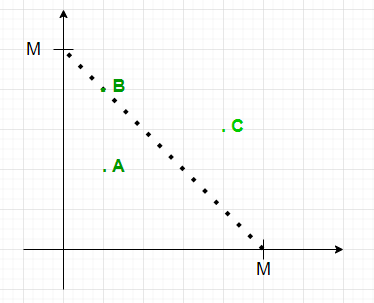Queries to count points lying on or inside an isosceles Triangle with given length of equal sides
Last Updated :
01 Jul, 2021
Given an array arr[][] of dimension N * 2 representing the co-ordinates of N points and an array Q[] consisting of M integers, the task for every element in the Q[i] is to find the number of points lying inside or on the right-angled isosceles triangle formed on the positive co-ordinate axis with two equal sides of length Q[i]in each query.
Examples:
Input: N = 4, arr[][] = { {2.1, 3.0}, {3.7, 1.2}, {1.5, 6.5}, {1.2, 0.0} }, Q[] = { 2, 8, 5}, M = 3
Output: 1 4 2
Explanation:
- First query: The point (1.2, 0.0) lies inside the triangle.
- Second query: The points { (2.1, 3.0), (3.7, 1.2), (1.2, 0.0) } lies inside the triangle and point (1.5, 6.5) lies on the triangle.
- Third query: The points {(3.7, 1.2), (1.2, 0.0)} lies inside the triangle.
Input: N = 3, arr[][] = { {0, 0}, {1, 1}, {2, 1} }, Q[] = {1, 2, 3}, M = 3
Output: 1 2 3
Explanation:
- First query: The point (0, 0) lies inside the triangle.
- Second query: The points { (0, 0), (1, 1) } lies inside the triangle.
- Third query: All the points lies inside the triangle.
Naive Approach: The simplest approach is to in each query traverse the array of points and checks if it lies inside the right-angled triangle formed. After completing the above steps, print the count.
Time Complexity: O(N * M)
Auxiliary Space: O(1)
Efficient Approach: The above approach can be optimized based on the following observations:

- A point (x, y) lies inside the isosceles right angle triangle formed on co-ordinate axis whose two equal sides are X if :
- x ? 0 && y ? 0 && x + y ? X
- By pre-storing the count of points with coordinates sum ? X, the query can be answered in constant time.
Follow the steps below to solve the problem:
Below is the implementation of the above approach:
C++
#include <bits/stdc++.h>
using namespace std;
int const MAX = 1e6 + 5;
int query(vector<vector<float> > arr,
vector<int> Q)
{
int pre[MAX] = { 0 };
for (int i = 0; i < arr.size(); i++) {
if (arr[i][0] < 0 || arr[i][1] < 0)
continue;
int sum = ceil((arr[i][0] + arr[i][1]));
pre[sum]++;
}
for (int i = 1; i < MAX; i++)
pre[i] += pre[i - 1];
for (int i = 0; i < Q.size(); i++) {
cout << pre[Q[i]] << " ";
}
cout << endl;
}
int main()
{
vector<vector<float> > arr = { { 2.1, 3.0 },
{ 3.7, 1.2 },
{ 1.5, 6.5 },
{ 1.2, 0.0 } };
vector<int> Q = { 2, 8, 5 };
int N = arr.size();
int M = Q.size();
query(arr, Q);
}
|
Java
import java.util.*;
class GFG
{
static int MAX = (int) (1e6 + 5);
static void query(double [][]arr,
int []Q)
{
int pre[] = new int[MAX];
for (int i = 0; i < arr.length; i++)
{
if (arr[i][0] < 0 || arr[i][1] < 0)
continue;
int sum = (int) Math.ceil((arr[i][0] + arr[i][1]));
pre[sum]++;
}
for (int i = 1; i < MAX; i++)
pre[i] += pre[i - 1];
for (int i = 0; i < Q.length; i++)
{
System.out.print(pre[Q[i]]+ " ");
}
System.out.println();
}
public static void main(String[] args)
{
double[][] arr = { { 2.1, 3.0 },
{ 3.7, 1.2 },
{ 1.5, 6.5 },
{ 1.2, 0.0 } };
int []Q = { 2, 8, 5 };
int N = arr.length;
int M = Q.length;
query(arr, Q);
}
}
|
Python3
MAX = 10**6 + 5
from math import ceil
def query(arr, Q):
pre = [0]*(MAX)
for i in range(len(arr)):
if (arr[i][0] < 0 or arr[i][1] < 0):
continue
sum = ceil((arr[i][0] + arr[i][1]));
pre[sum] += 1
for i in range(1, MAX):
pre[i] += pre[i - 1]
for i in range(len(Q)):
print(pre[Q[i]], end = " ")
if __name__ == '__main__':
arr = [[ 2.1, 3.0],
[ 3.7, 1.2],
[ 1.5, 6.5],
[ 1.2, 0.0]]
Q = [2, 8, 5]
N = len(arr)
M = len(Q)
query(arr, Q)
|
C#
using System;
public class GFG
{
static int MAX = (int) (1e6 + 5);
static void query(double [,]arr,
int []Q)
{
int []pre = new int[MAX];
for (int i = 0; i < arr.GetLength(0); i++)
{
if (arr[i,0] < 0 || arr[i,1] < 0)
continue;
int sum = (int) Math.Ceiling((arr[i,0] + arr[i,1]));
pre[sum]++;
}
for (int i = 1; i < MAX; i++)
pre[i] += pre[i - 1];
for (int i = 0; i < Q.Length; i++)
{
Console.Write(pre[Q[i]]+ " ");
}
Console.WriteLine();
}
public static void Main(String[] args)
{
double[,] arr = { { 2.1, 3.0 },
{ 3.7, 1.2 },
{ 1.5, 6.5 },
{ 1.2, 0.0 } };
int []Q = { 2, 8, 5 };
int N = arr.GetLength(0);
int M = Q.Length;
query(arr, Q);
}
}
|
Javascript
<script>
let MAX = (1e6 + 5)
function query(arr,Q)
{
let pre = new Array(MAX);
for(let i=0;i<MAX;i++)
pre[i]=0;
for (let i = 0; i < arr.length; i++)
{
if (arr[i][0] < 0 || arr[i][1] < 0)
continue;
let sum = Math.ceil((arr[i][0] + arr[i][1]));
pre[sum]++;
}
for (let i = 1; i < MAX; i++)
pre[i] += pre[i - 1];
for (let i = 0; i < Q.length; i++)
{
document.write(pre[Q[i]]+ " ");
}
document.write("<br>");
}
let arr=[[ 2.1, 3.0 ],
[ 3.7, 1.2 ],
[ 1.5, 6.5 ],
[ 1.2, 0.0 ] ];
let Q=[2, 8, 5];
let N = arr.length;
let M = Q.length;
query(arr, Q);
</script>
|
Time Complexity: O(N)
Auxiliary Space: O(N)
Share your thoughts in the comments
Please Login to comment...